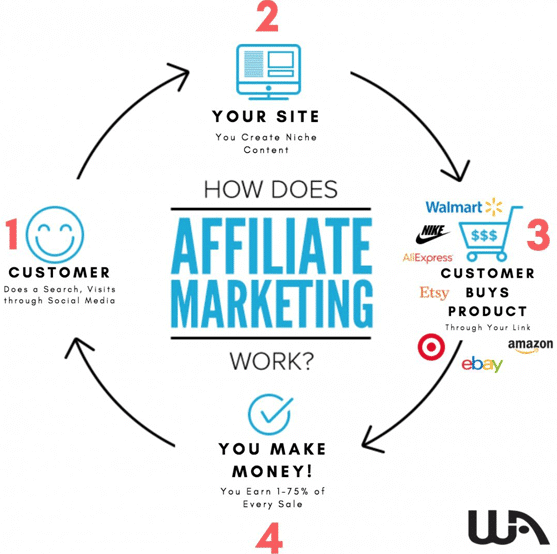I’m going to kick things off by explaining exactly what affiliate marketing is. In its simplest form, it’s a performance-based marketing approach where a business rewards one or more affiliates for each customer brought about by the affiliate’s own marketing efforts. Think of it as a commission-based system where you, as an affiliate, promote a product or service and get paid whenever someone makes a purchase through your referral.

This isn’t just about making quick money; it’s a strategic alliance. The symbiotic relationship between merchants and affiliates is the engine that powers this model. It’s a win-win: businesses get more customers without the hefty advertising costs, and individuals like you get the chance to earn money by sharing products they believe in. And the best part? You don’t need to have your own product to get started.
Why affiliate marketing, though? It’s all about reach and efficiency. Companies use it to extend their marketing reach without overstretching their budgets, while for individuals, it presents a viable avenue to monetize their audience, be it on a blog, a YouTube channel, or through social media following. It’s versatility and scalability make affiliate marketing a go-to strategy for both established brands and entrepreneurs alike.
The Origins and Evolution of Affiliate Marketing
You might be curious about how affiliate marketing emerged as a force in the digital world. The concept isn’t a modern-day invention; it has roots stretching back to the pre-digital era. However, the birth of affiliate marketing as we know it coincided with the rise of the internet. In the late 1990s, as the web began to weave its way into everyday life, companies realized the potential of leveraging external websites to drive sales, the seed from which affiliate marketing sprouted.
If we’re pinpointing milestones, 1994 is often marked as the year affiliate marketing was formally introduced. One of the first documented programs was initiated by a company called PC Flowers & Gifts. This initial model paved the way for future programs by compensating third-party ‘affiliates’ for directing customers to their offerings. As e-commerce grew, so did affiliate marketing, adapting and evolving with technological advancements and emerging platforms.
Fast-forward to 1996, and Amazon launched its now-famous Amazon Associates program. Not only did this provide a blueprint for other companies, but it also validated the model on a grand scale. The success of the Amazon Associates program can be attributed to its simplicity: affiliates share a product link, a purchase through that link earns them a commission, and the rest is history. This simplicity, combined with the growing ubiquity of the internet, created fertile ground for affiliate marketing to flourish.
Why did affiliate marketing catch on? It’s a blend of low-risk marketing for businesses and profit potential for marketers. Businesses only pay for actual performance, making it an attractive, cost-effective strategy. For individuals, it became a way to monetize existing audiences or content, with the freedom to choose partnerships that aligned with their brand or interests.
Naturally, the success of early adopters like Amazon encouraged other companies to invest in their own affiliate programs. Today, thousands of affiliate programs exist, covering almost every niche imaginable. Whether you’re interested in technology, fashion, or even online courses, there’s an affiliate program out there suitable for your interests and audience.
Pioneers of Affiliate Programs: From Amazon to Beyond
I’m going to take you back to 1996. That’s the year Amazon launched its Associates Program, becoming the prototype for future affiliate marketing schemes. This wasn’t just about selling books; it was the inception of a business model that would allow thousands of individuals and companies to earn income by promoting products.
Amazon’s program offered website owners a slice of the profits in exchange for featuring links to the retailer’s products. You could say they set the ball rolling for a range of affiliate opportunities that have since sprawled across numerous industries.
Now what is a big influence on the diversity in affiliate programs? Well, we’ve witnessed digital products, like software and eBooks, and services, such as travel bookings and financial services, all plugging into the affiliate marketing matrix. The ecosystem has become rich with possibilities for affiliates to find niches that resonate with them.
For those who might still be puzzled if there are alternatives to giant retailers like Amazon, guess what? There are. Platforms like ClickBank and ShareASale facilitate connections between companies and potential affiliates, covering everything from pet supplies to web hosting. These affiliate networks serve as intermediaries, ensuring smooth operation, payment, and product delivery.
And as for those who’ve already dabbled into affiliate marketing and want to optimize their approach, networks offer valuable analytics and insights—a significant advantage for tracking success and areas for growth.
Path to Independence: Financial and Time Freedom through Affiliate Marketing
You’re going to find out about how the allure of affiliate marketing isn’t just the potential to earn money, it’s also about gaining something just as valuable: time. This model opens up opportunities for remarkable independence, which is why it’s resonating with so many people.
In my opinion, the real draw of affiliate marketing is the way it can set you free from the conventional 9-to-5 grind. You get to create a business that works around your life, not the other way around. That means taking vacations when you want to, setting your own hours, and spending more time with family.

Think of affiliate marketing as a conduit to passive income. You put in the hard work up front – researching products, building a website or platform, and creating quality content. Then, over time, these efforts can continue to pay off, with less direct day-to-day involvement on your part. For many, that’s where the sense of freedom really comes into play.
Now what does this look like in real life? Consider Sarah, who started affiliate marketing as a side project while working a full-time job. After a year of dedication, her affiliate revenue surpassed her salary. Today, she manages her business from home, or from anywhere with an internet connection – truly exemplifying the independence affiliate marketing can offer.
You can always adjust your approach down the road, which is another beauty of affiliate marketing. Your first attempt doesn’t need to be your last. Continuous learning and adapting is key – and it’s also what makes this field so exciting and full of growth opportunities.
Affiliate Marketing: A Flourishing Future in 2024 and Beyond
As we look forward, affiliate marketing stands out as a dynamic and expansive field. It’s not just growing – it’s evolving, adapting to new technologies and consumer behaviors. I’m going to walk you through why this is a trend you can’t afford to ignore.
You’re going to find out about the current trends that are shaping the future of affiliate marketing. Think personalized marketing, advances in AI technology, and an increased focus on data analytics. These aren’t buzzwords; they are the reality that’s changing the game.
In the world of affiliate marketing, projections aren’t just lines on a graph; they’re a beacon of potential. It’s set to grow even further as we step into 2024. You may be wondering, what does this mean for someone just starting? It means opportunity – an opportunity to get in on the ground floor of a business model that’s on the rise.
There are over 5 billion people online, looking for something. The chances are you can tap into this market with specific niches that help people find answers to their problems.
With the right tools and strategies, staying ahead in the competitive affiliate space is achievable. We’re talking about leveraging social media platforms, understanding SEO, and choosing affiliate programs that align with your values and audience. These are the keys to not just participating but succeeding in the world of affiliate marketing.
In conclusion, affiliate marketing offers a unique combination of flexibility, income potential, and growth opportunity. It’s a field where diligence and creativity are handsomely rewarded. If you’re ready to take control of your financial and time freedom, affiliate marketing in 2024 could be your perfect match. Just remember, your first attempt doesn’t need to be your last. The landscape is always changing, and there’s room for innovation at every turn.
If you want to learn about my No:1 Affiliate Marketing platform then read my review on Wealthy Affiliate here.
Thanks for reading, take care
Tony
I am an affiliate for Wealthy Affiliate. If you purchase through my link then I will receive a commission at no extra cost to you.

Hi, my name is Tony and I’m the founder of Free From The Boss. I have been involved in affiliate marketing for a few years now and have made a success out of building online businesses. My aim with this website is to help you build and grow a successful online business for yourself and break free from your boss!

